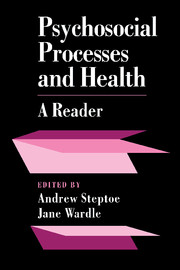Book contents
- Frontmatter
- Contents
- Preface
- Section 1 Life stress, social support and health
- Unemployment and mortality in the OPCS Longitudinal Study
- Job strain, work place social support, and cardiovascular disease: a cross-sectional study of a random sample of the Swedish working population
- Social networks, host resistance, and mortality: a nine-year follow-up study of Alameda County residents
- Goal frustration and life events in the aetiology of painful gastrointestinal disorder 68
- Psychosocial assets, life crisis and the prognosis of pregnancy
- Section 2 Psychophysiological processes in disease
- Section 3 Personality, behaviour patterns and health
- Section 4 Health practices and the modification of health risk behaviour
- Section 5 Coping with illness and disability
- Section 6 Behavioural interventions in medicine
- Index
Goal frustration and life events in the aetiology of painful gastrointestinal disorder 68
from Section 1 - Life stress, social support and health
Published online by Cambridge University Press: 05 August 2016
- Frontmatter
- Contents
- Preface
- Section 1 Life stress, social support and health
- Unemployment and mortality in the OPCS Longitudinal Study
- Job strain, work place social support, and cardiovascular disease: a cross-sectional study of a random sample of the Swedish working population
- Social networks, host resistance, and mortality: a nine-year follow-up study of Alameda County residents
- Goal frustration and life events in the aetiology of painful gastrointestinal disorder 68
- Psychosocial assets, life crisis and the prognosis of pregnancy
- Section 2 Psychophysiological processes in disease
- Section 3 Personality, behaviour patterns and health
- Section 4 Health practices and the modification of health risk behaviour
- Section 5 Coping with illness and disability
- Section 6 Behavioural interventions in medicine
- Index
Summary
Abstract
Life events and difficulties were recorded for the year preceding onset of abdominal pain in 135 consecutive referrals to three gastrointestinal clinics, and for the equivalent time period in a matched, healthy community comparison series. Fifty-six patients were found to have an organic gastrointestinal disorder. Severely threatening events and major difficulties known to play a critical aetiological role in clinical depression, occurred with much the same frequency during the 38 weeks before onset of non-organic (‘functional’) gastrointestinal disorder. There was no such relationship between the severity of threat and organic disorder. A measure of ‘goal frustration’ reflecting the degree to which the subjects’ aims and ambitions were insurmountably obstructed by the occurrence of the event, was significantly associated with organic disorder. This finding may explain the often reported association between life stress and organic gastrointestinal disorder.
Introduction
Impressive arguments have been developed stating that stress research has been led astray by its emphasis on particular social stresses leading to specific diseases, rather than seeing stressors raising susceptibility to disease in general [1]. Although we do not wish to deny the cogency of the argument, the fact is that our own experience within psychiatry points to the value of studying particular conditions and their link with particular kinds of stress. There is now clear evidence that the stressors for depression [2-4], differ in important ways from those for anxiety [3], and for schizophrenia [2, 5], and see no reason why a similar approach should not pay off in the area of physical disease.
In the case of gastrointestinal disorder, speculation about the role of life stress can be traced to virtually the first clinical descriptions [6-8]. But until recently work has been based on a small number of patients and although these early studies provided important insights they were unable to demonstrate convincing causal links even when supported by direct observation of the physiologic reactions of the gut to a variety of noxious stimuli [9-11].
- Type
- Chapter
- Information
- Psychosocial Processes and HealthA Reader, pp. 68 - 81Publisher: Cambridge University PressPrint publication year: 1994



